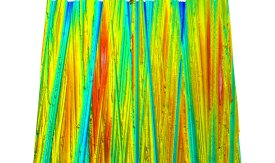May 15 2011
Olympus attended the recent International Conference on Metrology and Properties of Engineering Surfaces, where it displayed its advanced measuring confocal laser scanning microscopy, the LEXT OLS4000. Hosted by the National Physical Laboratory (NPL), the event was highly successful with a record number of delegates in attendance.
With a focus on surface metrology, surface characterisation instrumentation and properties of engineering surfaces, the conference provided an effective forum to discuss the challenges and issues of metrology in practice. By raising awareness of the need to establish calibration standards, users can effectively identify and reject doubtful observations, thus increasing the accuracy of resulting data.

As the 13th iteration of this international conference, the meeting has developed into a well-recognised assembly of experts within the field of metrology. Professor Richard Leach, Principal Research Scientist at the NPL, commented “The Met & Props conference has been a resounding success. The venue was second to none, everything went extremely smoothly and the quality of the speakers was exceptionally high. I think that all those that attended had an enjoyable and stimulating experience”.
Sharing expertise
With a number of talks from various experts within the field of metrology, the event proved to be highly educational and informative, with speakers discussing ways to improve measurement technologies and increase the accuracy of resulting data. Dr Chris Brown from the Surface Metrology Laboratory, Worcester Polytechnic Institute, USA, discussed his work on spike filtering and filling, which is intended to improve the quality of texture measurements. The presence of anomalous height readings can alter the assessment of surface quality assurance and obscure correlations, decreasing or eliminating the ability to discriminate between different surfaces. Because these spikes do not always reappear in the same location, his group has used the Olympus LEXT OLS4000 to obtain multiple measurements, which can be used to replace the heights at the locations where spikes have been removed.
Further emphasising the importance of obtaining accurate surface measurements, Dr Krüger-Sehm (PTB), in cooperation with German Industry and University partners, supports the development of a valuable resource to assist users in improving their understanding of topographic optical measurements. This unique tool will enable the accurate interpretation of measurement results.
Along the same theme, Professor Yanagi, Nagaoki University, Japan, spoke about the development of measurement standards for verifying the functional performance of surface texture measuring instruments. In a discussion of these techniques, he commented, “A diamond stylus can measure small surface variations in vertical displacement as a function of position, making it the ‘gold standard’ measurement technique. Although it will never be on par with the diamond stylus, confocal techniques are a close ‘silver’, providing a reliable and sensitive method of producing fast, accurate results.”
Olympus LEXT OLS4000
With profound expertise within the field of metrology, Olympus is deeply involved in the development of systems to provide surface topography data of the highest quality and consistency. Enabling pioneering research and routine inspection in material science, the Olympus LEXT OLS4000 confocal laser microscope incorporates a 405 nm laser and dual pinholes. These operate simultaneously to ensure that the system provides outstanding clarity and resolution, as well as enabling steep slope detection up to 85º. As a result, even the most complex surface topologies can be imaged and analysed with high resolution and clarity.